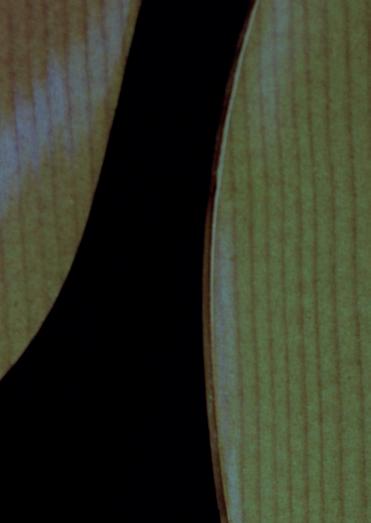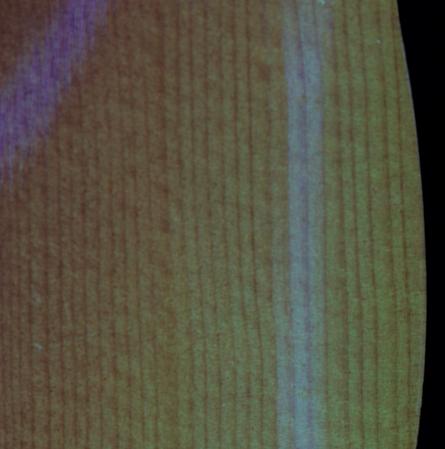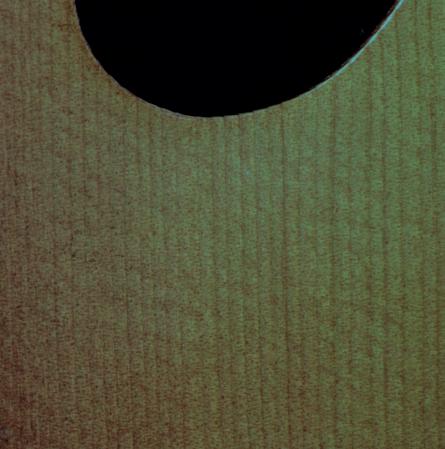











LEHRProgramm gemäß § 14 JuSchG

Gitarrenworkshops von

Chapter 1
The Breakdown of the
6/8 Clave Chord Exercise
Chapter 2
Shifting Gears
Four-Finger-Exercise
Four-Finger-Exercise slowly
Chapter 3
Shifting Gears in the Blues
Single Note Motif Blues
Multi Note Motif Blues
Eighth Notes Turnaround
Triplets Turnaround
Sixteenth Notes Turnaround
Chapter 4
Single Note Motifs
Single Note Motif 1
Single Note Motif 1 – Variation
Single Note Motif 2
Single Note Motif 2 – Variation
Single Note Motif 3
Single Note Motif 3 – Variation
Single Note Motif 4
Single Note Motif 4 – Variation
Single Note Motif 5
Single Note Motif 5 – Variation
Single Note Motif 6
Single Note Motif 6 – Variation
Single Note Motif 7
Single Note Motif 7 – Variation
Comp Motif
Chapter 5
Groupings of 5’s and 7’s
Groups of 5’s – 1 bar
Groups of 5’s – 2 bars
Comp – 5/4 over 4/4
Groups of 7’s – 2 bars
Groups of 7’s – 4 bars
Groups of 7’s – Blues for Waldo
Chapter 6
Double Time
Solo Exercise 1
Solo Exercise 1 - slow
Solo Exercise 2
Solo Exercise 2 - slow
Solo Exercise 3
Solo Exercise 3 - slow
Double Time Comp – Exercise 1
Double Time Comp – Exercise 2
Chapter 7
Latin-Rhythms (Bossa Nova)
Solo Exercise 1
Comp Exercise 1 (Clave)
Solo Exercise 2
Comp Exercise 2 (Clave)
Comp Exercise 3 (Clave)
Closing Statement

Kapitel 1
Die Unterteilung des Swing-Rhythmus
6/8 Clave Akkordübung
Kapitel 2
Shifting Gears
Vier-Finger-Übung
Vier-Finger-Übung langsam
Kapitel 3
Shifting Gears in the Blues
Single-Note-Motiv Blues
Multi-Note-Motiv Blues
Achtel-Noten Turnaround
Triolen Turnaround
Sechzehntel-Noten Turnaround
Kapitel 4
Single-Note Motive
Single-Note-Motiv 1
Single-Note-Motiv 1 – Variation
Single-Note-Motiv 2
Single-Note-Motiv 2 – Variation
Single-Note-Motiv 3
Single-Note-Motiv 3 – Variation
Single-Note-Motiv 4
Single-Note-Motiv 4 – Variation
Single-Note-Motiv 5
Single-Note-Motiv 5 – Variation
Single-Note-Motiv 6
Single-Note-Motiv 6 – Variation
Single-Note-Motiv 7
Single-Note-Motiv 7 – Variation
Comp-Motiv
Kapitel 5
5er- und 7er-Gruppierungen 5er-Gruppierung, eintaktig 5er-Gruppierung, zweitaktig
Comp – 5/4 über 4/4 7er-Gruppierung, zweitaktig 7er-Gruppierung, viertaktig 7er-Gruppierung, Blues for Waldo
Kapitel 6
Double Time
Solo-Übung 1
Solo-Übung 1 – langsam
Solo-Übung 2
Solo-Übung 2 – langsam
Solo-Übung 3
Solo-Übung 3 – langsam
Double Time Comp – Übung 1
Double Time Comp – Übung 2
Kapitel 7
Latin-Rhythmen (Bossa Nova)
Solo-Übung 1
Comp-Übung 1 (Clave)
Solo-Übung 2
Comp-Übung 2 (Clave)
Comp-Übung 3 (Clave)
Schlusswort
Having a solid understanding of rhythms is extremely important in playing music. It is probably more important than having good harmonic knowledge because without rhythm we can’t make music. Having good “time” is important, but developing a good “feel” is extremely more important. This is something that many musicians put off doing.
This DVD will break down the different types of feels in Jazz & Blues and give you a variety of rhythmic motifs to use and expand upon in your soloing and comping. These tools are necessary in becoming a better musician and will make your soloing and comping much more interesting.
I will discuss the breakdown of feels and inner rhythms, subdivision of various rhythms as well as how to create a good solid feel. The motifs in this DVD can be used in a wide variety of ways and will help you better understand rhythmic development which all of the GREAT musicians of the past 100 years possess.
Ein solides Verständnis der Rhythmen ist extrem wichtig in der Musik. Es ist wahrscheinlich wichtiger als ein gutes harmonisches Wissen, denn ohne Rhythmus können wir keine Musik machen. Gutes Timing ist wichtig, aber die Entwicklung eines guten Rhythmusgefühls ist weitaus wichtiger. Die Auseinandersetzung mit diesem Thema ist etwas, dem viele Musiker aus dem Weg gehen.
Diese DVD setzt sich mit den verschiedenen Arten der Feels in Jazz & Blues auseinander und liefert euch eine Vielzahl von rhythmischen Motiven, die sich in eurem Solospiel und Comping einsetzen und ausbauen lassen. Diese Werkzeuge sind notwendig, euch zu einem besseren Musiker zu machen und euer Solospiel und Comping wesentlich interessanter zu gestalten.
Ich werde euch den Umgang mit euren inneren Rhythmen und deren Unterteilung erklären und auch, wie man ein gutes, solides Feel erzeugt. Die Motive auf dieser DVD können auf vielfältige Art genutzt werden und werden euch helfen, besser zu verstehen, wie ihr euch rhythmisch weiterentwickeln könnt. Alle großen Musiker der letzten 100 Jahre haben sich intensiv mit diesem wichtigen Thema auseinandergesetzt.
The rhythmic phrase on all soloing examples is the same. This shows the versatility of a rhythmic phrase and how it can be used it many different settings. If I think of the eighth notes as sixteenths in half time, I can space them more evenly and execute them easier. I won’t be as tense. Looseness is the key to playing fast.
Die Rhythmusphrasierung ist bei allen SoloBeispielen identisch. Das zeigt die Vielseitigkeit einer rhythmischen Phrase und wie sie in vielen verschiedenen Kontexten eingesetzt werden kann. Wenn ich mir die Achtelnoten als Sechzehntelnoten in Half Time vorstelle, kann ich sie noch gleichmäßiger verteilen und leichter ausführen. Lockerheit ist der Schlüssel zum Erreichen eines schnelleren Tempos.

Impressum:
Fotos und Gestaltung: Manfred Pollert
Notensatz und Transkriptionen: David Becker, Peter Autschbach
Lektorat: Peter Autschbach
Produktion: Peter Finger
© 2013 by Acoustic Music GmbH & Co. KG, Osnabrück
Das Notenbild ist urheberrechtlich geschützt und darf nicht ohne Genehmigung des Verlages vervielfältigt werden. Music engraving copyright protected.
Best.-Nr. FP 8140
ISBN 978-3-938679-84-5
ISMN 979-0-700307-40-0
FingerPrint / Acoustic Music GmbH & Co. KG
Jahnstraße 1a · 49080 Osnabrück
Tel.: 0541-71 00 20 · Fax 0541-70 86 67
E-Mail: order@acoustic-music.de www.acoustic-music.de www.fingerprint-verlag.de
www.davidbeckertribune.com

David Becker
Der Journalist und TV-Moderater Roger Willemsen nannte ihn „einen der besten Jazz-Gitarristen aller Zeiten“, und das Magazin Jazz Podium erhob ihn zum „Poet der Jazz-Gitarre“. Seit mehr als zwei Jahrzehnten gehört David Becker zu den wirklich außergewöhnlichen Musikern seines Genres. Mit seiner Band David Becker Tribune spielte er in rund zwanzig Ländern und teilte sich die Bühne mit Größen wie Miles Davis, Chick Corea oder Joe Diorio. Insgesamt elf Alben, vier allein bei Acoustic Music, hat der in Cincinnati, Ohio, geborene Musiker bislang veröffentlicht. Die meisten schafften es in die Jazz-Charts, zwei wurden für einen Grammy nominiert. Dass David Becker mit seiner ausgefeilten Technik und seiner lyrischen Klangsprache nicht nur Puristen begeistert, zeigt besonders sein jüngstes Album, „Batavia“, in dem er die Geschichte seiner familiären Wurzeln musikalisch verarbeitet und zeigt, wie universell verständlich und bewegend Musik sein kann.
David Becker



The journalist and TV host, Roger Willemsen, called him “one of the best jazz guitarists of all time”, and the magazine Jazz Podium, elevated him to the rank of “poet of the jazz guitar”. For over two decades now, David Becker has been considered one of the truly outstanding musicians of his genre. Together with his band, David Becker Tribune, he has played in about 20 countries and has shared the stage with such luminaries as Miles Davis, Chick Corea and Joe Diorio. He was born in Cincinnati, Ohio, and has so far released a total of eleven albums, four of which with Acoustic Music. Most of them have made it into the jazz charts; two were even nominated for a Grammy. David Becker’s refined technique and the lyricism of his musical language is not only a thrill for purists. His latest album “Batavia”, in which he has explored the history of his family’s roots and shows how music can be understood universally and move people, demonstrates this.



www.davidbeckertribune.com



DVD: in English and German language/in englischer und deutscher Sprache


